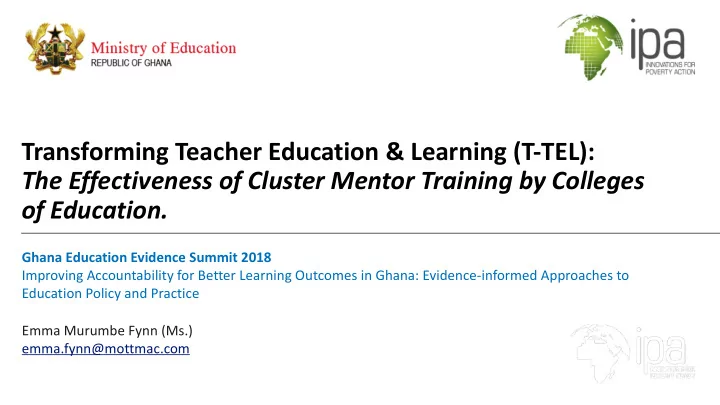

Transforming Teacher Education & Learning (T-TEL): The Effectiveness of Cluster Mentor Training by Colleges of Education. Ghana Education Evidence Summit 2018 Subtitle placeholder Improving Accountability for Better Learning Outcomes in Ghana: Evidence-informed Approaches to Education Policy and Practice Presenter Name Emma Murumbe Fynn (Ms.) Title of email@poverty-action.org emma.fynn@mottmac.com
T-TEL – Transforming Pre-service Teacher Training A Government of Ghana programme implemented by the Ministry of Education through the National Council for Tertiary Education (NCTE) in collaboration with other education sector agencies. T-TEL is funded by the UK Department for International Development (DFID). Its mission is to transform the delivery of Pre-Service Teacher Education in Ghana by improving the quality of teaching and learning through support to all public Colleges of Education. 1 2 Improving individual teacher Transforming teacher educators’ competence educators’ beliefs and practices 3 Overcoming resistance to deliver sustained change More capable beginning teachers
Pre-service teacher training at baseline (2015) Learning is academic Limited quality focused with limited school assurance of student practice. teacher experience Inadequate support to student teachers on practicum Ad-hoc partnerships College of Education (CoE) Partner School
Teaching Practice - Context There are three parts to the practical teaching experience that Student Teachers at the Colleges of Education undertake. Year 1 students do a 10-day school observation between the first and • second semester break. Year 2 students undertake a 2-4 week On-Campus Teaching Practice • (OCTP), which consists of peer and micro-teaching, during the second semester of Year 2. Year 3 Students do a two-semester teaching practice in a primary school or • junior high school in the region of their college of education.
School Partnerships Intervention
School Partnerships Intervention cont.
Improving The Effectiveness Of College Training Classroom application (Teacher Trainee and Pupils at St Joseph Primary School, Ghana) College Tutor Capacity Tutors share skills with Development teacher trainees (Tutors from Ada College, (Tutors and Teacher trainees Ghana) from OLA College, Ghana)
Cluster Mentor Training Cluster training for T-TEL workshop to Mentors train Teaching Practice 40 Coordinators and Colleges Tutors Cluster training for Mentors Cluster Target : 8,016 Experienced training Teachers in 2016/2017 for Mentors
Response from Mentees for 2017 Teaching Teaching Practice Journal Practice Materials. How often does your Mentor use their Is Not Mentor Handbook? Shown Shown 45% 55% 2.20% Everyday Once per week 5.60% Student Teacher Handbook Once per month 18.30% Is Shown 28% Never Not Shown 73.90% 72% (Cf SPA : 65%) Source: JMK Consulting Firm, Field Data T-TEL, Midline study, 2017
Key findings From the data available, it seems that tutors were well prepared, through training delivered by the TPC , to deliver the Year 1 and Year 2 teaching practice programmes. However, they appear not to have been as ready to support mentors and student teachers in schools Lead mentors and mentors themselves reported being very satisfied with the training provided by colleges , and fully prepared to implement the learning programme in schools supported by the handbooks. College tutors and T-TEL staff provided support to mentors and student teachers following mentor training. However, the frequency and quality of support was insufficient.
Key findings The materials were a strong element of the programme of support. Basing them upon UCCs assessment competencies made them immediately relevant and useful to Student Teachers. The intervention paid close attention to engagement and orientation of District Directors of Education, Circuit Supervisors and Girls Education Officers. TPCs themselves felt well prepared after the training workshops with T-TEL , and this is borne out by evidence from the cluster training for mentors that shows that TPC and tutors generally covered the required material well, with a few exceptions
Constraints to Effectiveness of CMT q Assessment of in-school teaching practice. q Frequency and quality of link tutor support. q Information management systems, and communication systems. Management information systems in schools and colleges are extremely weak. These are required to plan placements, to monitor students’ progress, to determine how many books to print, to track the movement of resources. q Low status of teaching in pre-tertiary schools q Teachers are not sufficiently motivated to see mentoring as a professional role
Improving pre-service training processes and practices Output indicator 2.4: % of male and female colleges tutors demonstrating gender-sensitive instructional methods Midline Endline Baseline 68.9%* 1.8% 46.7%* Male 3.6% 48.5%* 64.4%* Female 2.2% 47.1%* 68.0%* Overall * p<0.05 Source: JMK Research Group field data, 2015, 2017 & 2018
Conclusions, Policy Implication and Up-scaling Locating the cluster training off the college campus had many benefits. It • brought colleges closer to schools and contributed to stronger relationships with schools and districts. It allowed training in reasonable numbers, and the training was easier to attend and more affordable for mentors and district officers because of the proximity to their places of work. Colleges must consolidate the work they have done this year by continuing • to work with the same partner schools next year. This year, colleges chose schools that were closer to them to make it easier for students to attend weekly classes.
Conclusions, Policy Implication and Up-scaling • Colleges would benefit from support to their information management systems, particularly around teaching practice, given the large volume of students, schools, mentors, and locations that are involved each year. • Finally we note that in the new National Teacher Education Curriculum Framework, Supported Teaching in Schools is one of the four pillars, and this will therefore lift the requirements of training of mentors and the effectiveness of teaching practice. A far greater emphasis on supported teaching in schools will require re-engineering of tutors’ work schedules so that link tutors are able to provide the support to mentors required, particularly in the first few years of reform. • In addition, the new PTPDM Policy emphasizes competencies in mentorship as a requirement for teacher career progression. This will therefore be an additional incentive for dedicated interest in the role of mentors in schools.
Thank you
Recommend
More recommend